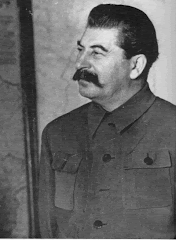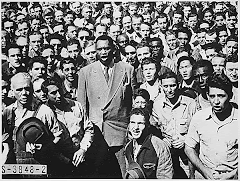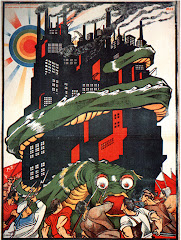Thursday, February 28, 2013
Head of the Communist Party USA projects an analysis and mish-mash of Democratic Party nonesense and social democratic excuses without advancing any specific solutions.
http://www.peoplesworld.org/is-full-employment-possible-under-capitalism/
Is full employment possible under capitalism?
by: Sam Webb
February 27 2013
tags: Jobs, workers rights, capitalism, CPUSA, history, economics
Editor's note: The following are remarks given by Communist Party USA chair Sam Webb at a Feb. 25 University of Georgia debate sponsored by Phi Kappa Literary Society. The debate topic was "Is full employment possible under capitalism?" Webb debated Greg Morin from the Libertarian Party of Georgia.
Billed as "The Debate That Never Happened," UGA's Phi Kappa Literary Society decided to recreate an attempted 1963 debate between CPUSA's Arnold Johnson and UGA economist David Wright. That attempt had been squelched by a unanimous vote of the Faculty Committee on Student Affairs. The society was accused of attempting to "incite riot." In the spirit of free speech, the society hosted this debate during its 50th anniversary.
Thank you, and thanks to Phi Kappa Literary Society for the invitation to participate in this debate on this beautiful campus and in this historic chapel. Thanks also to Speak Progress.
The debate question - "Is full employment possible under capitalism" - is by no means an academic one.
By last count, approximately 12 million Americans were officially unemployed. Of those, 4.7 million have been jobless for 27 weeks or longer.
If we include in our calculations discouraged workers who have stopped looking, and part-time workers who would prefer full-time work, the number is much higher - roughly 20 million people.
If you are African American, Latino, Native American Indian, and/or young, you are going to be overrepresented in those figures.
Here in Georgia the unemployment rate stands at 8.6 per cent. Without fundamental changes in public policies, it is hard to see how this awful situation will change.
Which prompts the question: Is persistent and high joblessness - not to mention stagnant and falling living standards - U.S. capitalism's "new normal?"
If it were, it would contrast with the world that I grew up in. That era, stretching from the end of World War II to the early 1970s, is sometimes referred to as the "Golden Age" of capitalism.
This phrase doesn't capture the full complexities of that period, but it does capture some of its most salient features, namely, that it was an era of sustained growth, diminishing inequality, and low unemployment - the likes of which we hadn't seen before or since.
My father, for example, who was a lineman in the backwoods of Maine, never experienced a layoff, even a short one, in a work life that began during the Depression and ended in the late 1960s.
At the time, economists thought that the cyclical ups and downs of the economy had been tamed and that full or near-full employment was the normal condition of capitalism, not only here but also in Western Europe and Japan.
But looking back a half-century later, one has to think that this period might well be the exception rather than the rule of capitalist development.
Now it's true that during the Clinton and Bush years rates of unemployment were relatively low and the recessions were relatively mild, but I would add four caveats.
First of all, the expansion of employment during this period took place mainly in low-wage, non-union and service sector jobs. The growth of Walmart into the nation's largest employer is emblematic of this phenomenon.
The second caveat is that under the weight of chronic overproduction in global commodity markets, a new phase of the technological revolution, and the relocation of production to low wage economies, tens of millions of jobs, especially in manufacturing, were permanently lost. Many of these jobs provided livable wages and modest health and retirement benefits to "middle class families."
Another caveat is the Clinton-Bush years were marked by growing income inequality and downward social mobility. The gap between the top income layers of our society - the one per cent - and the vast majority of wage and salary workers grew enormously to an historic high.
A final, and especially damning, caveat is economic growth and employment levels rested on enormous stock, housing, and financial bubbles, massive deregulation of markets, and the production of unending amounts of business and consumer debt.
While providing a lift to an otherwise sluggish economy, this financial frenzy engineered on Wall Street and in Washington and driven by corporate capital's drive for maximum profits wasn't sustainable, and eventually came to an end in an economic crisis, the likes of which we haven't seen since the Great Depression.
To sum up, the Clinton-Bush years are not cracked up to what conventional wisdom would like us to believe.
Since 2008, some pickup in economic activity has occurred, but overall employment gains and economic growth have been fitful and meager.
Moreover, it's hard to see where the economic dynamism and jobs are going to come from without action by the federal government, and the restructuring of the economy on a scale that only a few in Washington are ready to embrace.
After all, debt and bubble-driven growth that greased the wheels of the economy during the Clinton and Bush years is not an option.
Nor should any help be expected from our global partners. Europe is stuck in an economic quagmire and its austerity policies are only making it worse. China isn't positioned to carry the rest of the world on its shoulders. In fact, the Chinese economy's growth has also slowed, and it is feeling the contradictions that come from its deep integration into the capitalist global economy.
Furthermore, the longer-term processes that I mentioned earlier - overproduction in global commodity markets, job-displacing technologies, and global supply lines that fan out to distant lands - will only become more pronounced in the years ahead.
Economic crises are supposed to be how capitalism clears away the debris that impedes a revival of production, profits, employment and growth, but that scenario doesn't appear to be the case today.
So I'm guessing you know how I'm going to answer the question of this debate: is full employment possible under capitalism in today's conditions?
My answer, in case there is any doubt, is NO!
Transnational corporate capitalism, in its endless quest to accumulate capital and wealth, has morphed from a generator of jobs and rising income to a generator of unemployment, inequality, and insecurity.
I would quickly add that there are ways to ameliorate the jobs crisis. But only if the American people bring the power of their numbers and unity to bear on government at all levels, much like Americans did in the 1930s.
In his first four years, President Obama enacted policies that prevented the floor from falling out of the economy - an economy, by the way, that was stalled primarily due to insufficient demand for goods and services.
In his recent State of the Union address, President Obama proposed a higher minimum wage, stronger educational opportunities, rebuilding the deteriorating infrastructure, immigration reform, and investment in green technologies and jobs.
He also resisted calls for sweeping austerity measures from his Republican counterparts, since if enacted, they would reduce aggregate demand and in turn exacerbate the economic and jobs crises.
All of which are welcome.
Nevertheless, the president's package of proposals addresses only the edges of the deep and long-term jobs crisis that faces our country.
Indeed, he missed an opportunity to project a bold, transformative "new jobs" agenda. For the sake of our fragile planet and ourselves, such an agenda would transform our economy from one dominated by Wall Street, Lockheed Martin, Peabody Coal, Exxon and Walmart to a Main Street economy rooted in a green, demilitarized production, clean and renewable energy, livable wages and union protections, publicly-owned banks, public controls over the investment policies of the Fortune 500, affirmative action and equality, the modernization of mass transit, aid for small and medium-sized businesses, renewal of both urban and rural communities, democratic forms of worker ownership, and a progressive tax structure.
This reorientation of our economy would create millions of jobs, raise living standards, promote fairness and equality, and give us a fighting chance of mitigating the worst effects of climate change.
Of course, if I had my druthers, I would prefer socialism - democratic, working people driven, and people not profit centered.
But that debate is for another time.
Discussion---
Sam Webb put forward the myth that capitalism in the United States from the end of World War II until the 1970's had something approaching full employment and a decent standard of living for most working people. Nothing could be further from the truth. Webb gives the example of his own family which wasn't anything like the "norm" for most working class families who worked for poverty, and near poverty wages, with millions unemployed.
At best, many working class families were able "to get by" from pay-day to pay-day. Webb didn't have to live this way so he doesn't understand--- nor, does he care to understand because the facts would be in conflict with the reality his new-found Democratic Party and foundation-funded outfits don't want to acknowledge.
In fact, Sam Webb ignores the fact that it was the Communist Party USA which pushed to the front of political discourse the need for the president and the United States Congress to be responsible for attaining and maintaining full employment and it was this demand which became the "Full Employment Act of 1945;" defeated by the most vicious anti-working class, anti-union and anti-Communist campaign directed by Wall Street.
See:
http://fullemploymentnow.blogspot.com/2013/01/full-employment-is-issue-when-it-comes.html
Why did Webb leave the need for this kind of legislation out of this debate?
Probably for the same reason he didn't bring forward the specifics of a program which would provide full employment by putting people to work solving the many problems the working class is experiencing
Webb correctly stated that capitalism can't solve the problem of unemployment; but, what he failed to declare is that working class struggle, irrespective of capitalism, can achieve full employment while positioning the working class in a position to eliminate capitalism.
But, Webb doesn't believe in the working class struggle for peace, social and economic justice; Webb adheres to the fallacy the well-meaning Democrats will provide the leadership in bringing about reforms.
If Webb seriously believed struggles of working people are the prerequisite to winning real reforms he would allocate the vast resources of the CPUSA towards these ends. Any organization that has two-million dollars to remodel its offices and hire staff to fill these offices certainly has at least a few million dollars more to invest in the kind of initiatives required to advance and initiate working class struggles around specific solutions to the problems working people are experiencing which Webb has alluded to.
Webb claims, and rightly so, the unemployment is a serious problem and, again, rightly so, that unemployment is a consequence of capitalism; what would it take for the CPUSA to establish help launch an organization to push for passage of a modern-day version of the "Full Employment Act of 1945?"
Look; lots of problems, most all of our problems in fact, are a consequence of capitalism but militant, united, determined and persistent working class struggles can overcome these consequences of capitalism; unemployment is no different. Webb; with his non-struggle ideology which has nothing to do with Marxism, in spite of his claim that, again correct, that working class struggles have won very significant reforms. But, it was the Communist Party USA's Communist Clubs and organizations which initiated these struggles--- not Democrats.
Why didn't Webb explain what kind of things we could have instead of unemployment if the priorities of this country were peace instead of militarism and wars? Why didn't Webb explain how Obama's imperialist wars are killing jobs the same way they kill people?
Webb is afraid to blame Obama for anything and this is why he can't articulate the specifics of what is required to end unemployment because Webb would have to acknowledge that instead of Obamacare which he supports, what we need is National Public Health Care; what we need instead of Obama's phony pre-school scam is a National Public Health Care System--- combined, both of these programs would put every single unemployed person to work providing desperately need social programs and for substantially less than what Obama's dirty imperialist wars are costing us.
Webb doesn't advance the need for WPA, CCC and C.E.T.A.
Webb is content to "win" a debate by explaining why capitalism can't solve the unemployment problem without explaining that people's struggles can end unemployment.
If Webb had his "druthers" he would rather have socialism--- well, neither Obama nor Wall Street will ever provide working people with socialism, either.
There is a reason every time working people encounter any problem the solution to those problems are found in class struggle.
It's too bad those attending this debate in Georgia didn't have the opportunity to hear the views of a real Communist.
Obama never "missed" the opportunities for real reforms as Webb suggests; Obama never had any intent to explore the opportunity for real reforms--- and there-in lies the problem and the difference between one who is content holding up the Dumb Donkeys' tails begging to pick up what the sparrows leave behind and working class struggles around specific goals and objectives like full employment.
And how could the topic of socialism be considered a topic for debate for another time if capitalism can't solve the problem of unemployment? Don't people have the right to know how and what socialism can do differently to create a full employment economy without opposition?
Here is a program that can solve the problem of unemployment that capitalism has created:
A program for real change...
* Peace--- end the wars in Iraq, Afghanistan and Libya and shutdown the 800 U.S. military bases on foreign soil.
* A National Public Health Care System - ten million new jobs.
* A National Public Child Care System - three to five million new jobs.
* Works Progress Administration - three million new jobs.
* Civilian Conservation Corps - two million new jobs.
* Tax the hell out of the rich and cut the military budget by ending the wars to pay for it all which will create full employment.
* Enforce Affirmative Action; end discrimination.
* Raise the minimum wage to a real living wage
* What tax-payers subsidize in the way of businesses, tax-payers should own and reap the profits from.
* Moratorium on home foreclosures and evictions.
* Defend democracy by defending workers' rights including the right to collective bargaining for improving the lives and livelihoods of working people.
* Roll-back and freeze the price of food, electricity, gas and heating fuels; not wages, benefits or pensions.
* Defend and expand Social Security.
* Wall Street is our enemy
How is Barack Obama's Wall Street war economy working for you?
Climate change is like war, poverty and unemployment... without peace we aren't going to solve this problem either.
Let's talk about the politics and economics of livelihood for a real change.
Alan L. Maki
Co-chair,
Lake-of-the-Woods Communist Club
Is full employment possible under capitalism?
by: Sam Webb
February 27 2013
tags: Jobs, workers rights, capitalism, CPUSA, history, economics
Editor's note: The following are remarks given by Communist Party USA chair Sam Webb at a Feb. 25 University of Georgia debate sponsored by Phi Kappa Literary Society. The debate topic was "Is full employment possible under capitalism?" Webb debated Greg Morin from the Libertarian Party of Georgia.
Billed as "The Debate That Never Happened," UGA's Phi Kappa Literary Society decided to recreate an attempted 1963 debate between CPUSA's Arnold Johnson and UGA economist David Wright. That attempt had been squelched by a unanimous vote of the Faculty Committee on Student Affairs. The society was accused of attempting to "incite riot." In the spirit of free speech, the society hosted this debate during its 50th anniversary.
Thank you, and thanks to Phi Kappa Literary Society for the invitation to participate in this debate on this beautiful campus and in this historic chapel. Thanks also to Speak Progress.
The debate question - "Is full employment possible under capitalism" - is by no means an academic one.
By last count, approximately 12 million Americans were officially unemployed. Of those, 4.7 million have been jobless for 27 weeks or longer.
If we include in our calculations discouraged workers who have stopped looking, and part-time workers who would prefer full-time work, the number is much higher - roughly 20 million people.
If you are African American, Latino, Native American Indian, and/or young, you are going to be overrepresented in those figures.
Here in Georgia the unemployment rate stands at 8.6 per cent. Without fundamental changes in public policies, it is hard to see how this awful situation will change.
Which prompts the question: Is persistent and high joblessness - not to mention stagnant and falling living standards - U.S. capitalism's "new normal?"
If it were, it would contrast with the world that I grew up in. That era, stretching from the end of World War II to the early 1970s, is sometimes referred to as the "Golden Age" of capitalism.
This phrase doesn't capture the full complexities of that period, but it does capture some of its most salient features, namely, that it was an era of sustained growth, diminishing inequality, and low unemployment - the likes of which we hadn't seen before or since.
My father, for example, who was a lineman in the backwoods of Maine, never experienced a layoff, even a short one, in a work life that began during the Depression and ended in the late 1960s.
At the time, economists thought that the cyclical ups and downs of the economy had been tamed and that full or near-full employment was the normal condition of capitalism, not only here but also in Western Europe and Japan.
But looking back a half-century later, one has to think that this period might well be the exception rather than the rule of capitalist development.
Now it's true that during the Clinton and Bush years rates of unemployment were relatively low and the recessions were relatively mild, but I would add four caveats.
First of all, the expansion of employment during this period took place mainly in low-wage, non-union and service sector jobs. The growth of Walmart into the nation's largest employer is emblematic of this phenomenon.
The second caveat is that under the weight of chronic overproduction in global commodity markets, a new phase of the technological revolution, and the relocation of production to low wage economies, tens of millions of jobs, especially in manufacturing, were permanently lost. Many of these jobs provided livable wages and modest health and retirement benefits to "middle class families."
Another caveat is the Clinton-Bush years were marked by growing income inequality and downward social mobility. The gap between the top income layers of our society - the one per cent - and the vast majority of wage and salary workers grew enormously to an historic high.
A final, and especially damning, caveat is economic growth and employment levels rested on enormous stock, housing, and financial bubbles, massive deregulation of markets, and the production of unending amounts of business and consumer debt.
While providing a lift to an otherwise sluggish economy, this financial frenzy engineered on Wall Street and in Washington and driven by corporate capital's drive for maximum profits wasn't sustainable, and eventually came to an end in an economic crisis, the likes of which we haven't seen since the Great Depression.
To sum up, the Clinton-Bush years are not cracked up to what conventional wisdom would like us to believe.
Since 2008, some pickup in economic activity has occurred, but overall employment gains and economic growth have been fitful and meager.
Moreover, it's hard to see where the economic dynamism and jobs are going to come from without action by the federal government, and the restructuring of the economy on a scale that only a few in Washington are ready to embrace.
After all, debt and bubble-driven growth that greased the wheels of the economy during the Clinton and Bush years is not an option.
Nor should any help be expected from our global partners. Europe is stuck in an economic quagmire and its austerity policies are only making it worse. China isn't positioned to carry the rest of the world on its shoulders. In fact, the Chinese economy's growth has also slowed, and it is feeling the contradictions that come from its deep integration into the capitalist global economy.
Furthermore, the longer-term processes that I mentioned earlier - overproduction in global commodity markets, job-displacing technologies, and global supply lines that fan out to distant lands - will only become more pronounced in the years ahead.
Economic crises are supposed to be how capitalism clears away the debris that impedes a revival of production, profits, employment and growth, but that scenario doesn't appear to be the case today.
So I'm guessing you know how I'm going to answer the question of this debate: is full employment possible under capitalism in today's conditions?
My answer, in case there is any doubt, is NO!
Transnational corporate capitalism, in its endless quest to accumulate capital and wealth, has morphed from a generator of jobs and rising income to a generator of unemployment, inequality, and insecurity.
I would quickly add that there are ways to ameliorate the jobs crisis. But only if the American people bring the power of their numbers and unity to bear on government at all levels, much like Americans did in the 1930s.
In his first four years, President Obama enacted policies that prevented the floor from falling out of the economy - an economy, by the way, that was stalled primarily due to insufficient demand for goods and services.
In his recent State of the Union address, President Obama proposed a higher minimum wage, stronger educational opportunities, rebuilding the deteriorating infrastructure, immigration reform, and investment in green technologies and jobs.
He also resisted calls for sweeping austerity measures from his Republican counterparts, since if enacted, they would reduce aggregate demand and in turn exacerbate the economic and jobs crises.
All of which are welcome.
Nevertheless, the president's package of proposals addresses only the edges of the deep and long-term jobs crisis that faces our country.
Indeed, he missed an opportunity to project a bold, transformative "new jobs" agenda. For the sake of our fragile planet and ourselves, such an agenda would transform our economy from one dominated by Wall Street, Lockheed Martin, Peabody Coal, Exxon and Walmart to a Main Street economy rooted in a green, demilitarized production, clean and renewable energy, livable wages and union protections, publicly-owned banks, public controls over the investment policies of the Fortune 500, affirmative action and equality, the modernization of mass transit, aid for small and medium-sized businesses, renewal of both urban and rural communities, democratic forms of worker ownership, and a progressive tax structure.
This reorientation of our economy would create millions of jobs, raise living standards, promote fairness and equality, and give us a fighting chance of mitigating the worst effects of climate change.
Of course, if I had my druthers, I would prefer socialism - democratic, working people driven, and people not profit centered.
But that debate is for another time.
Discussion---
Sam Webb put forward the myth that capitalism in the United States from the end of World War II until the 1970's had something approaching full employment and a decent standard of living for most working people. Nothing could be further from the truth. Webb gives the example of his own family which wasn't anything like the "norm" for most working class families who worked for poverty, and near poverty wages, with millions unemployed.
At best, many working class families were able "to get by" from pay-day to pay-day. Webb didn't have to live this way so he doesn't understand--- nor, does he care to understand because the facts would be in conflict with the reality his new-found Democratic Party and foundation-funded outfits don't want to acknowledge.
In fact, Sam Webb ignores the fact that it was the Communist Party USA which pushed to the front of political discourse the need for the president and the United States Congress to be responsible for attaining and maintaining full employment and it was this demand which became the "Full Employment Act of 1945;" defeated by the most vicious anti-working class, anti-union and anti-Communist campaign directed by Wall Street.
See:
http://fullemploymentnow.blogspot.com/2013/01/full-employment-is-issue-when-it-comes.html
Why did Webb leave the need for this kind of legislation out of this debate?
Probably for the same reason he didn't bring forward the specifics of a program which would provide full employment by putting people to work solving the many problems the working class is experiencing
Webb correctly stated that capitalism can't solve the problem of unemployment; but, what he failed to declare is that working class struggle, irrespective of capitalism, can achieve full employment while positioning the working class in a position to eliminate capitalism.
But, Webb doesn't believe in the working class struggle for peace, social and economic justice; Webb adheres to the fallacy the well-meaning Democrats will provide the leadership in bringing about reforms.
If Webb seriously believed struggles of working people are the prerequisite to winning real reforms he would allocate the vast resources of the CPUSA towards these ends. Any organization that has two-million dollars to remodel its offices and hire staff to fill these offices certainly has at least a few million dollars more to invest in the kind of initiatives required to advance and initiate working class struggles around specific solutions to the problems working people are experiencing which Webb has alluded to.
Webb claims, and rightly so, the unemployment is a serious problem and, again, rightly so, that unemployment is a consequence of capitalism; what would it take for the CPUSA to establish help launch an organization to push for passage of a modern-day version of the "Full Employment Act of 1945?"
Look; lots of problems, most all of our problems in fact, are a consequence of capitalism but militant, united, determined and persistent working class struggles can overcome these consequences of capitalism; unemployment is no different. Webb; with his non-struggle ideology which has nothing to do with Marxism, in spite of his claim that, again correct, that working class struggles have won very significant reforms. But, it was the Communist Party USA's Communist Clubs and organizations which initiated these struggles--- not Democrats.
Why didn't Webb explain what kind of things we could have instead of unemployment if the priorities of this country were peace instead of militarism and wars? Why didn't Webb explain how Obama's imperialist wars are killing jobs the same way they kill people?
Webb is afraid to blame Obama for anything and this is why he can't articulate the specifics of what is required to end unemployment because Webb would have to acknowledge that instead of Obamacare which he supports, what we need is National Public Health Care; what we need instead of Obama's phony pre-school scam is a National Public Health Care System--- combined, both of these programs would put every single unemployed person to work providing desperately need social programs and for substantially less than what Obama's dirty imperialist wars are costing us.
Webb doesn't advance the need for WPA, CCC and C.E.T.A.
Webb is content to "win" a debate by explaining why capitalism can't solve the unemployment problem without explaining that people's struggles can end unemployment.
If Webb had his "druthers" he would rather have socialism--- well, neither Obama nor Wall Street will ever provide working people with socialism, either.
There is a reason every time working people encounter any problem the solution to those problems are found in class struggle.
It's too bad those attending this debate in Georgia didn't have the opportunity to hear the views of a real Communist.
Obama never "missed" the opportunities for real reforms as Webb suggests; Obama never had any intent to explore the opportunity for real reforms--- and there-in lies the problem and the difference between one who is content holding up the Dumb Donkeys' tails begging to pick up what the sparrows leave behind and working class struggles around specific goals and objectives like full employment.
And how could the topic of socialism be considered a topic for debate for another time if capitalism can't solve the problem of unemployment? Don't people have the right to know how and what socialism can do differently to create a full employment economy without opposition?
Here is a program that can solve the problem of unemployment that capitalism has created:
A program for real change...
* Peace--- end the wars in Iraq, Afghanistan and Libya and shutdown the 800 U.S. military bases on foreign soil.
* A National Public Health Care System - ten million new jobs.
* A National Public Child Care System - three to five million new jobs.
* Works Progress Administration - three million new jobs.
* Civilian Conservation Corps - two million new jobs.
* Tax the hell out of the rich and cut the military budget by ending the wars to pay for it all which will create full employment.
* Enforce Affirmative Action; end discrimination.
* Raise the minimum wage to a real living wage
* What tax-payers subsidize in the way of businesses, tax-payers should own and reap the profits from.
* Moratorium on home foreclosures and evictions.
* Defend democracy by defending workers' rights including the right to collective bargaining for improving the lives and livelihoods of working people.
* Roll-back and freeze the price of food, electricity, gas and heating fuels; not wages, benefits or pensions.
* Defend and expand Social Security.
* Wall Street is our enemy
How is Barack Obama's Wall Street war economy working for you?
Climate change is like war, poverty and unemployment... without peace we aren't going to solve this problem either.
Let's talk about the politics and economics of livelihood for a real change.
Alan L. Maki
Co-chair,
Lake-of-the-Woods Communist Club





































